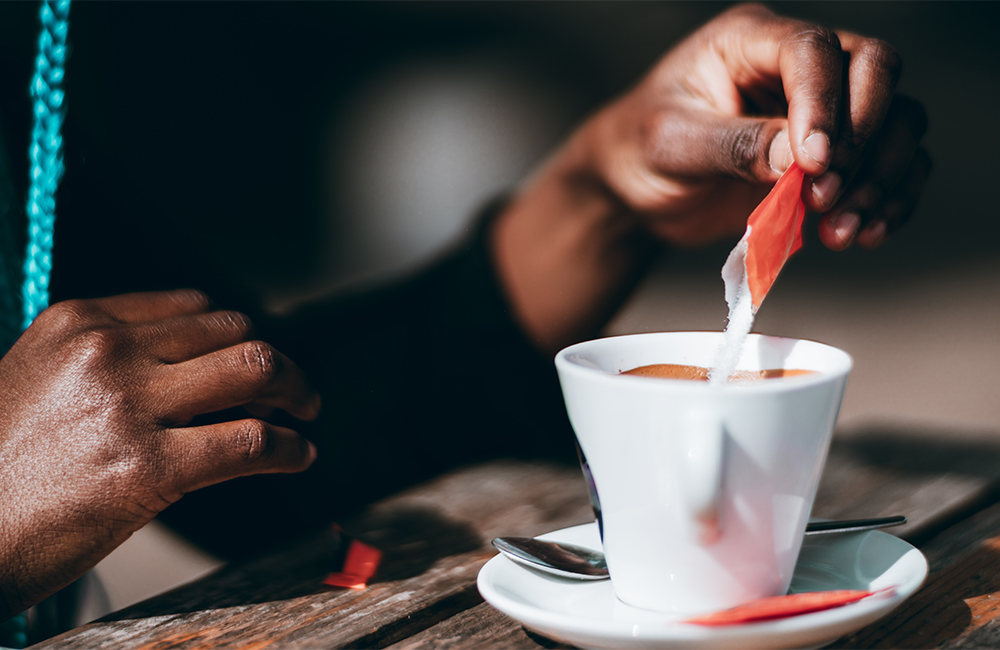Here’s how to handle those crazy cravings for sugar.
by Liz Scott

If you have a hankering for junk food, particularly sugary sweets, and treats, you already know you’re not alone. These voracious cravings are a normal part of recovery, and everyone has experienced them at one time or another, particularly during the earliest months of abstinence.
But why? Is it simply a craving for a sugar rush when fatigue hits, or is there more to it? Is it possible to become sugar-addicted, ultimately trading one addiction for another?
Let’s step back a few million years. Researchers believe that early man was genetically selected for sugar consumption because those who ate it — back then in the form of ripened, often fermented fruit — had more immediate energy than those who consumed only protein.
As a result, sugar eaters were more likely to outwit, outrun and outlast their sluggish counterparts —particularly helpful when pursuing a bison for the family dinner. The problem now seems to be that there is simply too much sugar available in the modern diet (the average American eats about 145 pounds of sugar annually) and not enough by way of bison hunting. So when we overindulge, we end up storing this energy in the form of fat and awaiting the hunt that never takes place.
As a throwback to early survival, a taste for sugar is, in fact, the only instinctual taste modern man is born with, while the other tastes of sour, salt, bitter and pungent are learned. Thus, you don’t have to be someone in recovery to have a taste for sugar — all of us do. But why does our taste urge verge on the obsessive? There may actually be an interesting genetic explanation.
A twin study at the University of North Carolina at Chapel Hill revealed that craving for sweets and the urge to drink likely stem from the same gene. Despite their different life experiences, separated twin brothers tended to share a preference for both sweets and alcohol. Those who reported “drinking more alcohol on occasion and having more alcohol-related problems” also reported cravings for sweets on other occasions, particularly when depressed or nervous.
Because environmental factors also play key roles in the development of addictions, some of the sugar cravers chose to satiate themselves with food, in particular carbohydrates and sugar. Others found, after repeated positive exposure to drugs and alcohol, that chemical substances provided a preferable, more powerful remedy for feeling good.
We know that when we become addicted to drugs and alcohol, our brain chemistry is changed in lasting ways. Chronic exposure can alter both the number of neurochemical receptors and their sensitivity. This is called neuroadaptation and helps to explain the phenomena of both tolerance and withdrawal. Maybe sweet cravings step up in their intensity in an attempt to somehow compensate — even self-medicate —for the lack of alcohol or drugs when we become sober. A far-fetched idea?
Jacob Teitelbaum, author of the book Beat Sugar Addiction Now!, believes that former addicts do indeed shift their addiction from alcohol and drugs to sugar and even end up experiencing similar feelings of compulsive craving as well as tolerance (to sugar taste) and withdrawal (fatigue and crankiness).
By exacerbating the situation by consuming too much caffeine and refined carbohydrates, which metabolize quickly in the body, we end up on a roller coaster of highs and lows, looking for resolution in the next doughnut and cafe latte. Quick fixes are followed by fatigue and frustration, and a need for more. Sound familiar?
In addition to these short-term symptoms, sugar cravings can also be indicative of the beginning of a number of other health problems, some with long-term and far-reaching consequences.
According to Teitelbaum, there are four different types of sugar addictions characterized by some of these varied underlying physical causes. A comprehensive quiz in his book will tell you whether you may be experiencing a hormonal deficiency, adrenal issues, yeast and candida overgrowth or other imbalances that may need addressing. In most cases, however, changes to improve nutrition and eating habits, as well as sleep patterns and an increase in exercise, will go a long way toward reducing the need for sugar fixes in the first place. By naturally improving your energy levels, you can preempt the energy crisis dip and maintain a steadier and healthier pattern of daily activity.
Do we need to give up our sweet treats? Not at all. Although sugar cravings seem relentless at first, in the end, they may help us to stay sober and get through the most difficult and challenging time while we begin the journey toward better eating habits and healthy alternatives. Eventually, sweets can have a place as an occasional reward or treat rather than a compulsion, as we heal on all levels. As Teitelbaum says about beating sugar addiction, “… getting rid of the sugar is but one step in an overall comprehensive approach that must address the mind, body, and spirit.”
Without a program to follow that includes attention to all these aspects of our lives as well as a strong support system, attempts at breaking sugar addiction are destined to fail. Hmm. Now that really sounds familiar.
Think Before You Snack
Instead of heading for the candy aisle, try the following for a boost of energy:
- Drink a 12-ounce glass of water.
- Take a five-minute walk.
- Close your eyes for 10 minutes and meditate.
- Enjoy a cup of green or white tea.
- Snack on a protein or granola bar.
Liz Scott is a nationally renowned author, chef, and caterer who uses her experience and expertise to specialize in the positive effects of good food on the recovery from disease, including alcohol and drug dependence.



No responses yet